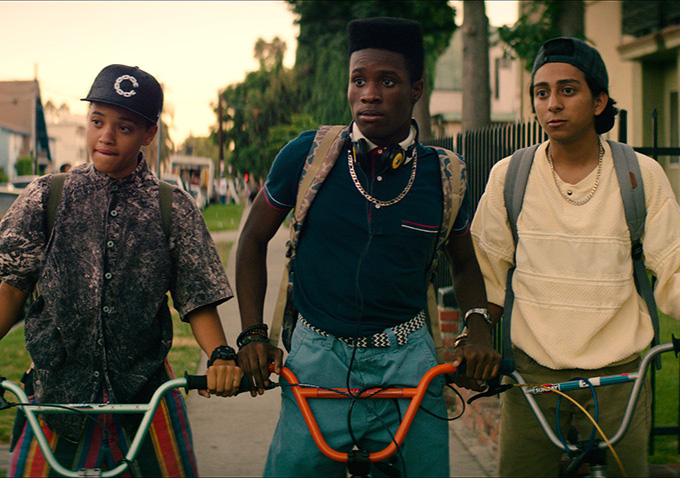 This is a reprint of our review from the 2015 Sundance Film Festival.
This is a reprint of our review from the 2015 Sundance Film Festival.
A coming of age tale for the post-hip hop and social media generation, a black geek picture for the Urkels and Kanye Wests of the world, a crime/drug caper, a comedy, a gettin’-out-of-the-ghetto film, and more, writer/director Rick Famuyiwa’s funny and vibrantly realized “Dope” packs in a lot of movie. Featuring a long, “Pulp Fiction”-like crime-comedy sprawl, with several story threads in the air, the movie also features a witty, sharp African-American cultural commentary a la “Dear White People.” And if that sounds dynamic, but a little overstuffed, that’s because it is.
But “Dope” starts out with fantastic energy, charm, and laughs. Centering on three friends in socio-economically challenged “The Bottoms” of Inglewood, California, the ‘90s hip hop culture obsessed trio of Malcolm (Shameik Moore), Jib (Tony Revolori), and Diggy (Kiersey Clemons), try to survive and get by. Malcolm, in particular, aspires for an education, dreaming of attending Harvard, and finding a way out of The Bottoms.
READ MORE: Watch A New Red Band Trailer For ‘Dope’ Plus 3 Clips

As the group of misfits try to navigate their social strata — they’re outcast nerds who also have a rowdy, punky hip hop band, while Diggy is a lesbian, which makes them even more removed from the status quo — they have to contend with bullies, bigots, drug dealers, gangsters, and more. Life gets complicated when a local drug slinger, Dom (rapper A$AP Rocky), recruits Malcolm to court Nakia (Zoë Kravitz), one of the local gorgeous honeys who also wants a future outside of the projects, for him.
These entanglements lead Malcolm and his friends to find some brief acceptance. When they’re invited to a dance party at Dom’s request, the night is exciting and exuberant, but when rival drug dealers crash the party, chaos erupts. In the madness, Dom hides his cocaine and guns in Malcolm’s backpack and the quest to retrieve the dope from various warring factions puts the adolescents in grave danger, setting off a series of wacky and perilous events.

Written and directed by Famuyiwa, “Dope” has much on its mind, from juggling genres, to commenting on the low expectations that society and teachers have for young African-American kids with few opportunities. Narrated by Forest Whitaker (also a producer), “Dope” pulsates with restless verve, ping-ponging around subjects and tangential observations about pop culture and adolescence like Tarantino on ecstasy. Its ADD discursiveness extends to our hyper-social media age. “Dope” flies through Twitter, YouTube, Gifs, internet memes, and more with hilarious dexterity (Michael Mann would also be proud of their use of TOR and darkweb back channels in some of the ridiculous, but amusing hacker scenes. Hacking scenes? Yes, this movie has everything).
The film’s snappy dialogue and rapid-fire pop culture annotations would probably make Kevin Smith, Drake, and RapGenius.com blush with envy. “Dope” manages to kinetically reference Neil Degrasse Tyson, myriad hip-hop touchstones (Digital Underground, Public Enemy, Jay-Z), “Game Of Thrones,” Coachella, The Fresh Prince Of Bel Air, and more.

But at 115 minutes, “Dope” is in need of serious taming. While it doesn’t lose its vivacious spark as much as some of the other Sundance films with brevity issues this year, somewhere inside “Dope” is a near-amazing movie. And “Dope” is kind of Jenga-like in its construction too. Even if a producer wanted to somehow chop this movie down to the 95-minute romp it should probably be, it likely can’t be dismantled too much without the entire structure tumbling down.
So “Dope” trips up a little bit, with too many endings (the Sundance 2015 curse), and the romantic subplot between Malcolm and Nakia feels forgotten by the time it concludes. As Malcolm uses his smarts and wit to outmaneuver the antagonists, Famuyiwa’s bloat becomes a bit silly and strained, but as most of it is played for laughs, these twists and turns don’t break the bank. While the script gets a bit didactic and scolding in its final moments, the big take away is the Yo! MTV Raps throwback playfulness the movie possesses in abundance.

A deep supporting bench doesn’t hurt either. Blake Anderson plays Will, a pot head genius who’s down and desperate to use the n-word — this little observational detour is hysterical — and Keith Stanfield (“Short Term 12”), Rick Fox, and Roger Guenveur Smith also appear.
Chock-a-block with super fly freshness, the good certainly outweighs the uneven. “Dope” is both intelligent and crowd-pleasing, and its vintage soundtrack (with new songs by Pharrell Williams too) will attract a wider crowd beyond an indie audience. Tackling the struggle of bad and worse choices that many of those in economically-challenged situations are afforded, “Dope” is about the dreams and aspirations of outsiders. While a little swollen narratively, its supercool vitality is much like Will Smith‘s blithe song “Summertime,” which the character’s reference: something very close to a new classic. [B+]

